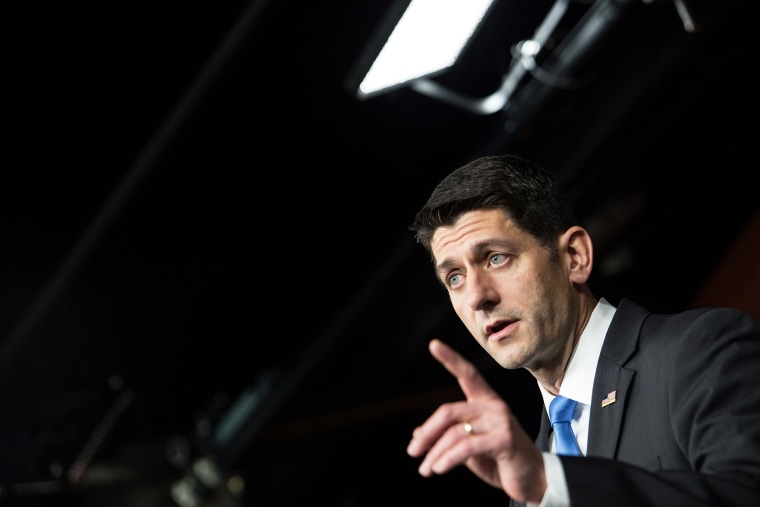House Speaker Paul Ryan (R-Wis.) deserves just a little credit for acknowledging the basic idea that congressional Republicans should have a policy agenda. Sure, it's clearing the lowest possible threshold for a major party that's already in the majority, but the Wisconsin congressman decided to launch a months-long effort to prove that the GOP really could be a 21st-century governing party.
In the end, however, Ryan has proven the opposite.
The Republican Speaker assembled a team of House Republican lawmakers and staffers to craft a multi-part "Better Way" plan. "What you will see with these [proposals] are detailed policy papers,"
Ryan declared a month ago. "We're not talking about principles here. This is substance."
If only that were true. Part One was Ryan's plan to address poverty, which
turned out to be laughable. Part Two was a national-security vision, which was not only ignored, it was
contradicted by his party's presumptive presidential nominee. Part Three in the Speaker's agenda was a deregulation plan that was just
a warmed over version of stale GOP demands. Part Four was
a health care reform plan that was accurately summarized this way: "Speaker Paul Ryan wants to replace 20 million people's health insurance with 37 pages of talking points."
All of which leads to today's tax-reform plan, which might actually be the worst plank yet. The
Washington Post reported:
The tax plan would slash rates across the board -- by 20 percent for businesses and 33 percent for individuals, simplify the tax filing process and restructure the international tax code. The plan embraces long-standing Republican principles like cutting rates and eliminating deductions while embracing a business consumption tax that is increasingly popular in conservative think-tank circles. Though the GOP proposal leaves out details -- such as which specific deductions would be eliminated and how much the plan would cost -- it offers a fuller alternative to the deep rate cuts pitched by presumptive Republican presidential nominee Donald Trump. [emphasis added]
I bolded that section for a reason: Paul Ryan, the Speaker of the House, the former chairman of the House Budget Committee, and a member of his party's 2012 national ticket, spent months on a tax-reform plan with no price tag.
No, seriously.
Here's the plan. It includes trillions of dollars in tax breaks for the wealthy, including the total elimination of the estate tax, but it doesn't include any meaningful accounting. House Republicans spent months putting together a "substantive" tax-reform plan that's little more than a wish list of all the taxes the GOP would like to cut, without so much as a hint of thought about how to pay for the package.
As the
Wall Street Journal noted, "The plan isn't detailed enough for a complete nonpartisan congressional analysis to verify the impact on the budget and on households."
It's a policy problem that Republicans support a plan to redistribute wealth from the bottom up, but there's a broader political problem with a major party that doesn't take its own proposals seriously enough to do its homework.
New York's Jonathan Chait
picked up on the common thread tying together Ryan's entire mulit-part agenda.
Republicans have omitted enough key details [in their tax-reform plan] to prevent a full measurement of the proposal's effects.... The same holds true of the House Republican plan to repeal and replace Obamacare. As with taxes, the overall direction of the policy is clear: It would strip away insurance from tens of millions of people, impose higher costs on people who are poor and sick, and provide lower costs for the affluent and healthy. But just how much cannot be calculated, because Republicans have, again, omitted the key details. [...] The same dynamic is also true of Ryan's much-hyped plan to overhaul poverty spending. House Republicans need to cut hundreds of billions of dollars in spending for the poor, since doing so is the only way to reconcile their commitment to deep tax cuts, higher defense spending, and maintaining retirement benefits for people age 55 and up. But Ryan also needs to pose as an earnest friend of the poor, not as the champion of the upward income distribution his policies would actually bring about. So the "anti-poverty" plan relies on vague language and pixie-dust promises about rooting out unstated waste.
As we
talked about a few weeks ago, the Speaker of the House has been eager, if not desperate, to show that he and his Republican conference are serious about governing -- so serious that they've spent months crafting a new election-year agenda that demonstrates just how committed the GOP is making a substantive difference.
The problem, obviously, is that the agenda is hollow and meaningless. Ryan set out to prove that Republicans are a governing party; he's inadvertently proven the opposite.
